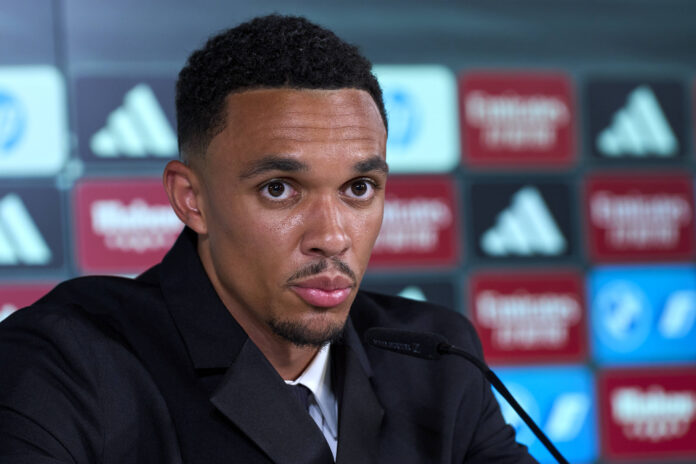Adjusting to Life Without Alexander-Arnold
Liverpool’s tactical evolution under Arne Slot has entered a crucial phase. The departure of Trent Alexander-Arnold to Real Madrid marked the end of an era for the Reds — one defined by precision, creativity, and a right flank that once dictated the rhythm of their attacking play. Now, as Liverpool continue to adjust, questions persist about whether his successors can truly fill that void.
Former Tottenham midfielder Jamie O’Hara has added his voice to the conversation, claiming that Liverpool effectively “sold a player as good as David Beckham.” While his comments have drawn attention, they underline a larger truth: Liverpool’s system has lost one of its primary architects.
Alexander-Arnold wasn’t just a right-back; he was an orchestrator. His passing range and vision redefined the full-back position, and his departure has forced Liverpool into tactical reconfiguration. The club had been well aware that replacing his unique influence wouldn’t be a simple matter of finding another defender — it required a shift in creative responsibility.
Frimpong and Bradley Offer New Dimensions
In the wake of Alexander-Arnold’s exit, Liverpool turned to youthful promise and tactical adaptability. Conor Bradley’s development has been a major positive story at Anfield. His energy, defensive diligence, and willingness to drive forward suggest long-term potential. Yet, even his most impressive outings highlight that he offers something different — not a replacement, but an alternative.
Meanwhile, Jeremie Frimpong’s arrival added another layer to Liverpool’s evolving system. Signed from Bayer Leverkusen, the Dutchman brings explosive pace and an attacking directness that contrasts sharply with Alexander-Arnold’s playmaking approach. Frimpong thrives on overlapping runs, quick transitions, and creating danger from the byline — rather than dictating play from deep.
What Liverpool gain in speed and dynamism, they momentarily lose in precision delivery. Alexander-Arnold’s trademark crosses and set-piece mastery often unlocked defences when nothing else would. Both Frimpong and Bradley will need time — and patience from supporters — to forge their own partnership with the forwards, especially in tight games where creativity down the right is crucial.
Adapting Tactics and Creative Responsibility
The solution may not lie solely in personnel, but in structure. Slot’s challenge is to redistribute creative duties across midfield and attack. Dominik Szoboszlai and Alexis Mac Allister have shown flashes of invention, while Andy Robertson continues to provide balance on the left. But without Alexander-Arnold’s deliveries, the responsibility to supply decisive passes has spread thin.
O’Hara’s comparison to Beckham may sound exaggerated, yet it captures the essence of what Liverpool miss — a consistent source of world-class distribution. The team’s rhythm has shifted from control and precision to intensity and speed, and this stylistic change is still bedding in. The integration of Frimpong and Bradley represents the beginning of a new identity, one less reliant on pinpoint crossing and more on fluid attacking combinations.
Liverpool’s Evolution Demands Patience
Liverpool’s adjustment to life after Alexander-Arnold is a process rather than a problem. As O’Hara noted, the side “just need to adapt the way they play.” It is not that the club miscalculated by allowing him to leave, but that his influence was irreplaceable in the short term.
In time, Frimpong’s flair and Bradley’s maturity could combine to redefine the role altogether. What once belonged to one player may now be shared by two — a reflection of Liverpool’s broader evolution under Slot. For now, the right-hand side remains a work in progress, but one built on promising foundations.




